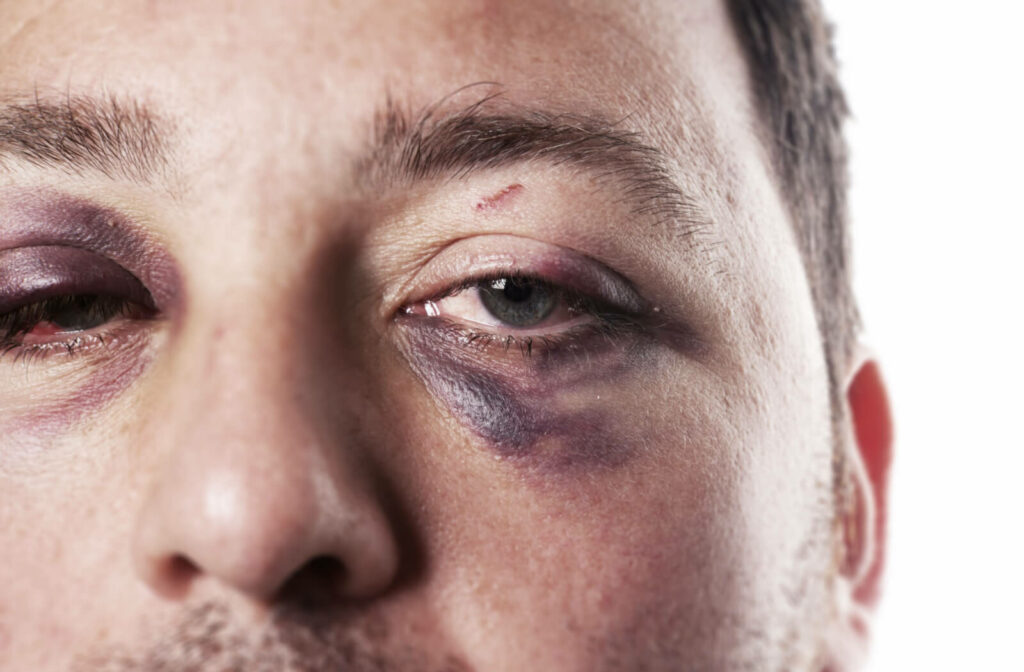We do what we can to protect our eyes, but accidents do happen. You could need an emergency eye exam for something as obvious as a cut, scratch, or foreign object in the eye, but other medical conditions can also come on fast and require immediate medical care.
Your doctor might have told you to watch out for quickly developing symptoms at your last eye exam, but there are common signs we can all look for that may indicate a severe condition. It’s better to prevent an injury than look for treatment, so ensure you always practice eye safety.
If you’re ever in doubt if your issue is an emergency, please contact us or visit your nearest emergency room.
Sudden Loss of Vision
If you experience a sudden loss of vision in one or both eyes, it is essential to seek an emergency eye exam immediately. This loss could be a symptom of a serious condition such as a retinal detachment or a stroke.
Blurred Vision
Blurred vision can be a symptom of several conditions, including a concussion, angle closure glaucoma, and conjunctivitis. In addition, a problem with any component of your eye could potentially cause blurred vision.
Floaters
Floaters are spots, threads, or squiggly lines that float across your vision. Typically they come and go, and most people don’t have to worry about them. However, sudden new floaters that don’t fade away could be a sign of more serious conditions like retinal detachment, retinal tear, or eye inflammation.
Getting Chemicals in Your Eye
Pain, discomfort, burning, or swelling could result from chemical exposure. Plenty of chemicals are dangerous to your eyes, so take extra care when working with:
- Soap
- Ammonia
- Bleach
- Vinegar
- Pesticides
- Fertilizer
If you believe you got a chemical in your eye, flush it with cool, clean water for 15 minutes, cover it gently, and contact a medical professional.
Redness or Swelling
An injury can cause redness or swelling of the eye, but if you notice these symptoms appear without an obvious cause, it could be linked to a different condition. Eye issues commonly involving redness or swelling include conjunctivitis (pink eye), blepharitis, and corneal ulcers. An eye doctor can help pinpoint the exact cause during an emergency eye exam.
Double Vision
If you are seeing two images of one object, it could be because of double vision. Children with crossed eyes will typically have double vision, but it can present in adults due to several diseases or conditions.
Unequal Pupils
Unequal pupils can result from direct eye trauma or inflammation of your optic nerve. If you notice your pupils are of uneven size after a head injury, contact 911 or go to the hospital immediately. This irregularity could signify a serious eye, brain, or neck injury.

Black Eye
Most black eyes aren’t serious and are typically the result of trauma to the head or face, causing bleeding beneath the skin. However, they could indicate a skull fracture or injury to your optical socket. If you notice any of these additional signs, seek medical attention immediately:
- Persistent headaches
- Nausea
- Vomiting
- Dizziness
- Lethargy
- Lapses in memory
- Blood draining from ear or nose
- Blood on the surface of your eyeball
Sudden Onset of Bulging Eyes
Some people are born with naturally protruding eyes, but it can also be a sign of a more serious medical condition. Generally, you shouldn’t be able to see the white part of your eye above your iris without lifting your eyelids. If your eyes suddenly bulge, it could result from hyperthyroidism or bleeding behind your eyes.
Discharge From the Eye
Nearly everyone wakes up with a bit of gunk in the corners of their eyes. It’s a sign that you’re blinking away all the mucus, skin cells, and oil from your eyes and keeping them healthy.
However, conditions like pink eye, styes, and corneal ulcers can change this discharge. If you notice your eye mucus is yellow, green, thick, and constantly being produced, contact your eye doctor for an emergency eye exam.
What Happens at an Emergency Eye Exam?
The above signs may indicate a severe condition that requires immediate medical attention. It’s crucial to seek an emergency eye exam if you are experiencing any of them. Your eyes are delicate, and eye damage can lead to partial or total vision loss.
If you believe your eye is injured, do not apply pressure to it. Instead, keep it covered and protected from the elements and seek medical attention.
During an emergency eye exam, your optometrist will thoroughly examine your eyes, which may include visual acuity tests, pupil dilation, and retinal examination. You may also have additional tests done, such as an ultrasound or a CT scan, to diagnose the underlying condition.
In some cases, your emergency could require immediate treatment, such as surgery or medication. For example, if you have a detached retina, your doctor may perform surgery to reattach the retina as soon as possible. In other cases, the condition may require ongoing treatment, such as medication or therapy.
Keeping Your Eyes Safe
Prevention is always preferred to finding a cure, so take care of your eyes to prevent emergencies from occurring. Prevention includes eating a healthy diet, exercising regularly, and wearing protective eyewear when necessary. Regular eye exams with an optometrist can also help detect any potential issues before they become emergencies.
Don’t wait for your vision problems to get out of hand. If you’re experiencing any of these symptoms, contact our team at Family EyeCare Center immediately.



